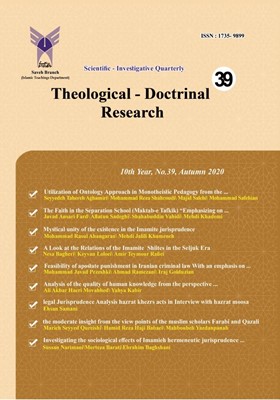Utilization of Ontology Approach in Monotheistic Pedagogy from the Holy Qurans point of View
Subject Areas : Islamic theology
Seyyedeh Tahereh Aghamiri
1
,
Mohammad Reza Shahroodi
2
,
Majid Salehi
3
,
Mohammad Safehian
4
![]()
1 -
2 - University of Tehran
3 -
4 -
Keywords:
Abstract :
According to instruction s of Holy Quran -as the most verified resources for recognition of glorious God-, monotheism is the principal of humans real life while blasphemy stands on the opposite point of it, is considered as the biggest cruelty and the unforgivable sin. Monotheistic ontology -by taking advantages of inspirational instruction- is a useful opponent and a substitution for positivistic, materialistic and nihilistic ontologies. These sorts of ontologies are not capable of introducing human’s pedagogy as they have diminished the fact of minor and major universes into the limitations of natural horizons and materialistic world. If the pedagogy of theist human establishes based on monotheistic ontology, human is considered as a theist living who identifies his external and internal aspects in a complete manner. The main issue with this study is to describe the elements of ontology that are related to human guide and pedagogy in order to reach the perfection and a good life, promised in Holy Quran. Through this paper, critical principals of monotheistic ontology considering “theology and cosmology” field are studied that are accounted as monotheistic pedagogy. The claims of some interpreters and ideologists of religious science and inspired scripts to confirm the properness and adaptation of descriptive and prescriptive ontological propositions with Quran instructions. Based on the results of this study, God -as the source and start point of all goodness- and the universe is the sign of truth and the situation in where the human faces the truth of God. In order to this, intrinsic need of human reveals in several stages of intrinsic, descriptive and performative monotheism. The result of this research is the true perception and understanding of a human about his position in the universe as a creator-dependent creature whose achievement to perfection and God, accelerates and sublimates, with consideration of lordship monotheism.
قرآن كريم.
ابن عربی ،محی الدین (1418ق)، الفتوحات المکیه، بیروت،: دارالاحیاءالتراث العربی.
ابن ابي الحديد (1378) شرح نهج البلاغه ، بيروت دار احياء التراث العربي.
ابن سینا، حسین بن عبد الله،(1363)، الهیات شفاء، تهران، انتشارات ناصر خسرو.
جوادی آملی، عبدالله (1387) تسنیم، تفسیر قرآن کریم، قم: مرکز نشر اسراء.
______ (1383)، توحيد در قرآن(تفسير موضوعي قرآن)، ج دهم، چ هجدهم، قم: اسراء..
______(1380)، المبدأ و المعاد، قم، مرکز انتشارات دفتر تبلیغات اسلامی.
______ (1389) تسنیم، تفسیر قرآن کریم، ج 19، قم: مرکز نشر اسراء.
______ (1397)، تفسیر موضوعی قرآن مجید، معرفت شناسی در قرآن، ج 13، قم:مرکز نشر اسراء.
دینانی، غلامحسین ، (1375)، اسماء و صفات حق، سازمان چاپ و انتشارات وزارت ارشاد، تهران.
سعیدی مهر، محمد،(1383)، آموزش کلام اسلامی، تهران، نشر طه.
سند تحول بنيادين نظام تعليم و تربيت جمهوري اسلامي ايران،(1390)، شوراي عالي انقلاب فرهنگي؛ شورايعالي آموزش و پرورش.
صدرالمتألهين، صدرالدين شيرازي، محمد بن ابراهیم، (1378)، الحکمه المتعالیه فی الاسفار العقليه الاربعه، قم: مصطفوي.
شيرازي، صدرالدين محمد(1380)، اسرارالآيات ، تهران: انجمن حکمت و فلسفه.
طوسى، محمدبن حسن(1389ق)، التبيان فى تفسير القرآن، بيروت: دار احياء التراث العـربى.
طباطبایی، محمد حسین(1372)، اصول فلسفه و روش رئالیسم، تهران: صدرا.
طباطبایی، محمد حسين(1370)، الميزان في تفسير القران، قم: انتشارات جامعه مدرسین.
______(1375)، نهایه الحکمه. ترجمه و شرح علی شیروانی، قم: دفتر تبلیغات اسلامی.
______(1389)، انسان از آغاز تا انجام، به كوشش سيد هادي خسرو شاهي، قم: بوستان کتاب.
طبرسى، فضل بن حـسن (1403ق)، مـجمع البيان فـى تفسير القرآن، تهران،: ناصر خسرو.
______(1365)، مـجمع الاحتجاج علی اهلاللجاج، بیروت دارالنعمان.
طوسی، ابی جعفر محمد بن الحسن، (بیتا) التبیان فی تفسیر القرآن، دار احیاء العرب، بیروت.
فيض کاشاني، ملا محمد محسن،(بيتا)، المحجة البيضاء في تهذيب الاحياء، نشر اسلامي.
______(بیتا)، تفسير الصافی، لبنان: مؤسسة الأعلمی.
قدردان قراملکي، محمد حسين، (1388)، پاسخ به شبهات کلامي؛ دفتر اول: خداشناسي، تهران: انتشارات پژوهشگاه فرهنگ و انديشه.
مجلسي، محمدباقر، بحارالانوار، بيروت، مؤسسة الوفاء، ۱۴۰۳ق.
مصباح، محمدتقى(1383) آمـوزش فلسفه، تهران، سـازمان تـبليغات اسلامى.
______(1389)،معارف قرآن(3-1)،قم: انتشارات مؤسسه آموزشی و پژوهشی امام خمینی(ره).
مطهري، مرتضي(1360)، مقدمهاي بر جهانبيني اسلامي، تهران: انتشارات صدرا.
________ (1377)، مجموعة آثار، ج 13، تهران: انتشارات صدرا.
نوذری، محمود، (1389)، بررسی تحول ایمان به خدا در دورة کودکی، نوجوانی و آغاز جوانی، پایاننامة دکتری، قم، پژوهشگاه.


